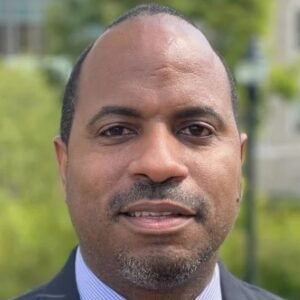
A recent study has found that Black men using or working for public transportation often face hostile encounters that threaten their safety and well-being. The study was co-authored by Gwendolyn Purifoye, assistant professor of racial justice and conflict transformation at the University of Notre Dame, and Derrick Brooms, professor and executive director of the Black Men’s Research Institute at Morehouse College.
While there has been significant prior research into Black men’s encounters with racism and discrimination in public, Dr. Purifoye and Dr. Brooms were particularly interested in examining Black men’s experiences with public transportation as both passengers and workers are temporarily confined while mobile with limited options to escape the dangers of racism and racial aggression.
The co-authors used U.S. Census data to identify racially and economically diverse areas around Chicago. Between 2010-2022, the research team conducted ethnographic observations on buses and trains that traversed these neighborhoods to determine passengers and workers’ perceptions of Black men, treatment of Black passengers and workers, and how Black men responded and tried to navigate their experiences.

According to their observations, the co-authors frequently saw non-Black passengers avoid Black male passengers, including ignoring requests for directions, physically moving away, and averting eye contact. The co-authors also witnessed heightened surveillance of Black male passengers by authority figures. Additionally, the researchers observed repeated hostile behaviors directed towards Black male transit workers, such as challenges to their authority and criticism of their job performance.
“The effects of racism and segregation that continue to spill into everyday interactions and movement through public spaces is damaging for Black men and exposes them to a range of harms, such as stress, frustration, and depression, and can decrease their community engagement,” the authors write. “As a result, racial aggression paints the landscape while acts of kindness are unusual. And, even further, the costs that Black men both suffer and brave continue to mount and demand more from them — more energy, more attention, and more emotional psycho-social labor.”
Dr. Purifoye and Dr. Brooms believe future research is needed to examine how Black men’s “interactions on public transportation inform the masculine scripts that they adopt and perform,” which may have further implications on their health and well-being.

